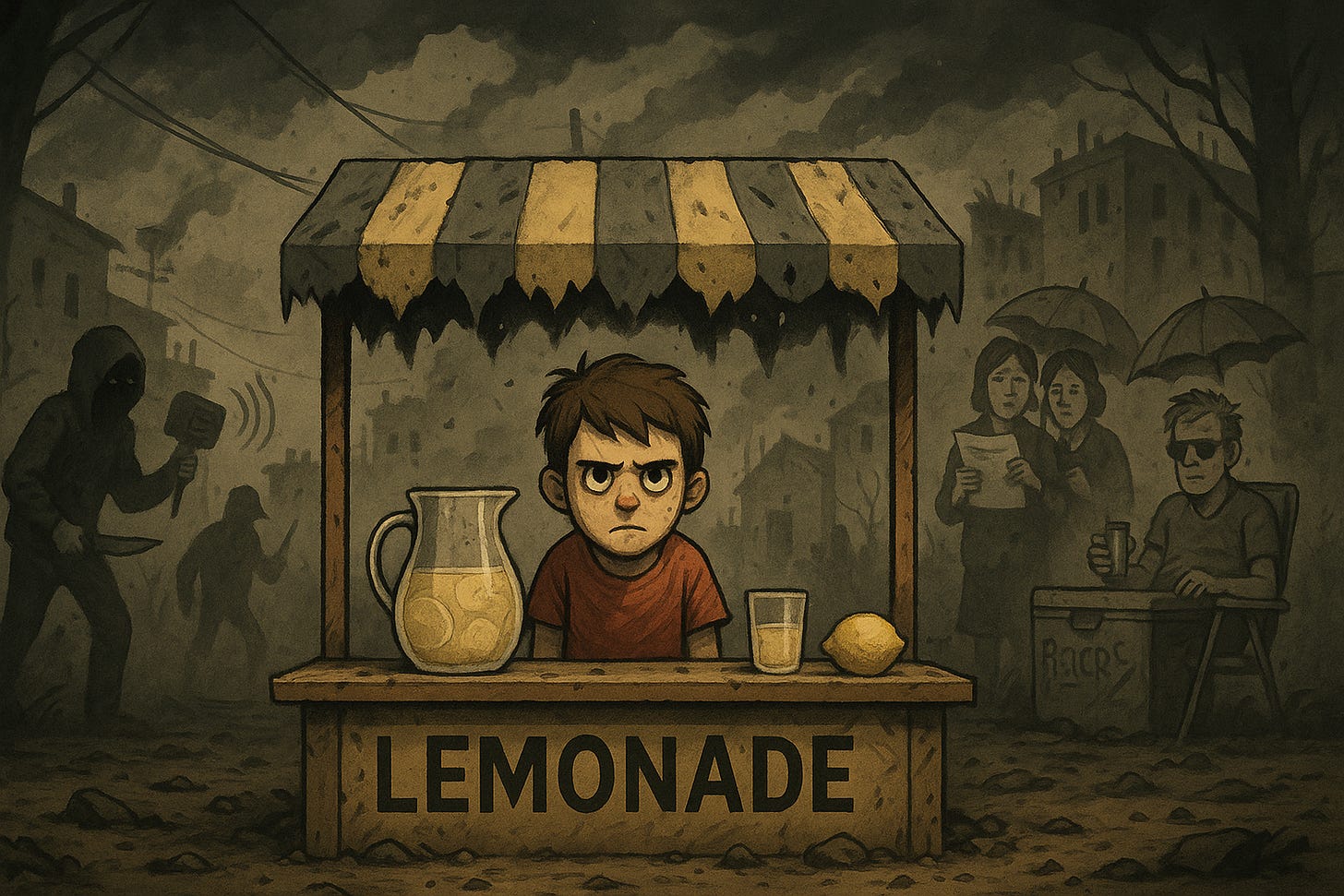When an Open Market Meets an Open Heart
Porters 5 Forces and a Lemonade Stand
Billy was nine. He believed in flavor. He believed in fairness.
That’s why he opened a lemonade stand. He believed that if you made something pure, cold, and real, people would pay for it.
By day ten, he was pissing in the lemons just to feel something.
Billy didn’t know what Porter’s Five Forces were. But he learned them the way most of us do: through humiliation, betrayal, and a crash course in unit economics.
This is his story.
1. Competitive Rivalry: Tommy Opens Across the Street with Kool-Aid and a Glock
Tommy wasn’t there to hydrate, he was there to dominate.
He showed up with a Bluetooth speaker, laminated pricing card, and a plastic Glock “for brand presence.”
His product was industrial Kool-Aid at 12 cents a cup. He undercut Billy by 75% and offered a punchcard that included emotional validation and one free fist bump per visit.
Billy tried to keep up by adding chia seeds and creating a loyalty program where every seventh cup came with a sticker and the fragile smile of a boy raised on meritocracy.
Tommy responded by telling everyone Billy’s lemonade gave you IBS.
2. Threat of New Entrants: Olivia Rolls Up With a Solar Powered Slush Tank
Olivia wasn’t selling drinks. She was selling absolution.
Hers was monk fruit electrolyte slush in biodegradable cups that whispered climate facts as they decomposed.
Olivia’s tagline: “Hydration with intention.”
Her goal: spiritually cleanse the market.
Billy applied for a sustainability grant and got added to a libertarian WhatsApp group full of teenagers discussing permaculture and off-grid sovereignty. One of them tried to recruit him into a raw milk MLM.
He started writing “Do your own research” on napkins.
3. Supplier Power: Grandpa Goes Full Cartel
Grandpa owned the trees. Billy thought that meant love.
What it really meant was leverage.
He jacked up lemon prices 300% and made Billy sign a contract in Sharpie with a clause that just said: “no bitching.”
He started wearing a Panama hat unironically and referring to himself as “Operations.”
Billy tried to pivot to limes. Grandpa responded by leaving a 2 a.m. voicemail that just said: “You think the world owes you juice, you son of a bitch?”
Eventually Billy started sourcing from Craigslist. One batch arrived moldy. One had a listening device taped to the rind.
4. Buyer Power: The Facebook Moms Would Like to Speak to the Manager
The neighborhood moms came in pairs. They asked questions like “Is this shade-grown?” and “Why aren’t you in school?”
They gave unsolicited feedback in Google Docs titled “Opportunities for Growth.”
One mom offered to feature him on her parenting blog in exchange for free lemonade.
Billy added a tip jar labeled “Mental Health Fund” but the moms said that felt off-brand.
He started handing out friendship bracelets no one asked for, and they said that felt desperate.
5. Threat of Substitutes: Chad Shows Up With a Cooler
Chad was 43. No one knew where he lived.
He wasn’t a parent or a child. He was just… there.
He pulled up a folding chair, opened a Yeti cooler, and started offering free LaCroix to any woman who walked by. He called it “third-space hydration.”
He didn’t ask for permission or charge money. He really just sat there and said things like “sometimes the grind is the trauma.”
Billy tried to compete by launching a podcast, but no one listened.
Exit Strategy
Billy still runs a lemonade business. Technically.
It’s a Delaware LLC now. There’s a ghost kitchen, and a drop-ship model where he sells DTC hydration cubes made from lab-simulated citrus via Shopify. The margins are fine.
But the original stand is gone. So are the moms. So is the part of him that thought good product mattered.
He doesn’t talk about it much. But every now and then, whenever someone whispers “customer journey,” you can see it behind his eyes: That first week. The heat. The smile he gave the moms before they asked if his sugar was organic.
And in that moment, he remembers the truth he learned too young:
That in a free market, belief is the product.
And the system always drinks first.


This is an example of how we've lost the ability to engage with ideas directly everything has to be wrapped in narrative packaging now, even basic business concepts.
Brilliant good sir. Brilliant.
Sounds like an episode of It’s Always Sunny